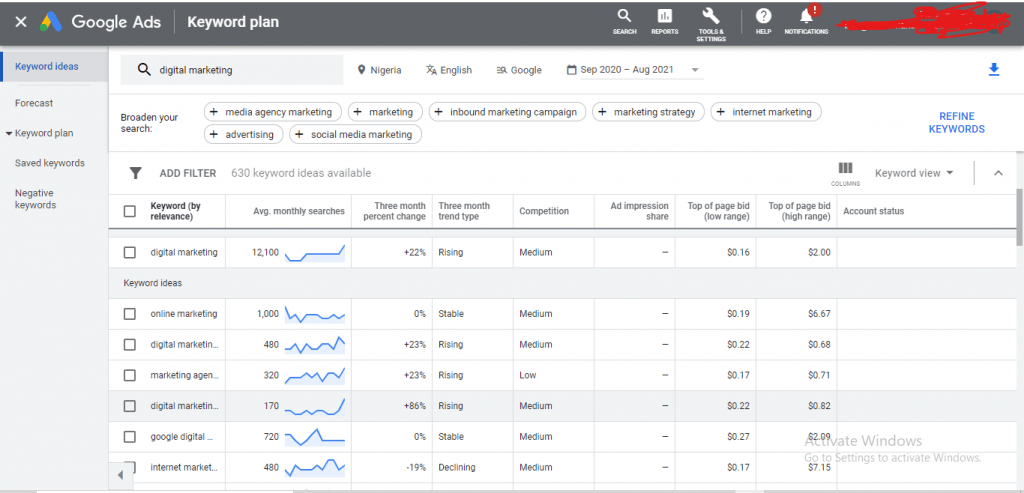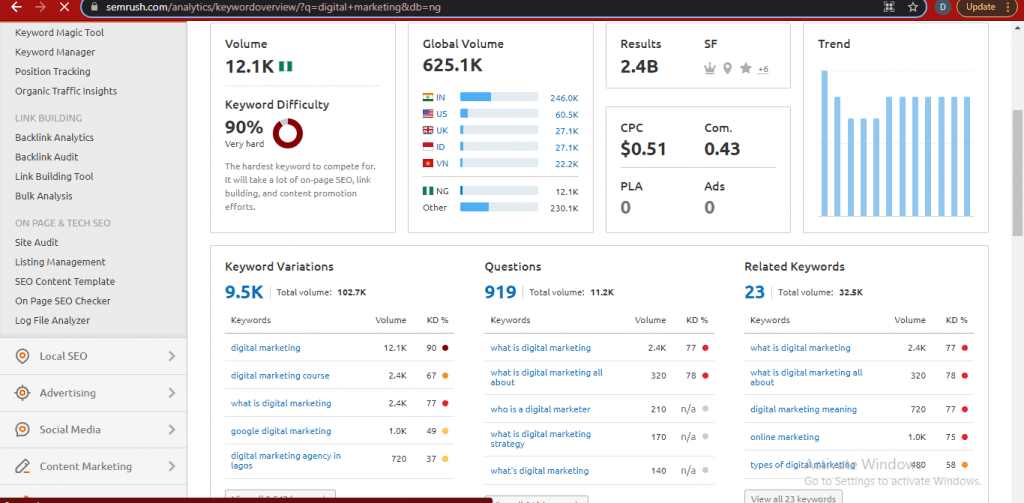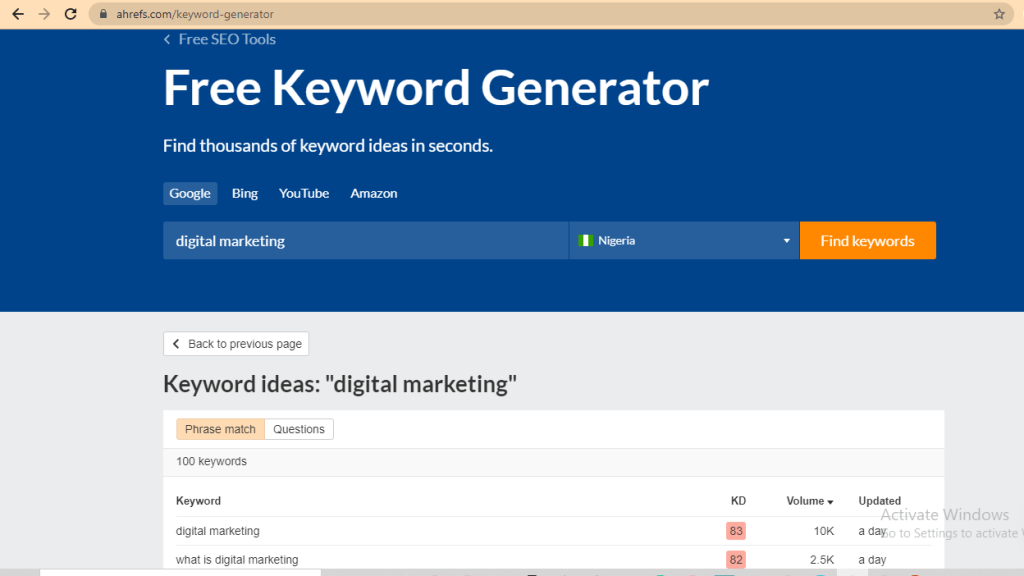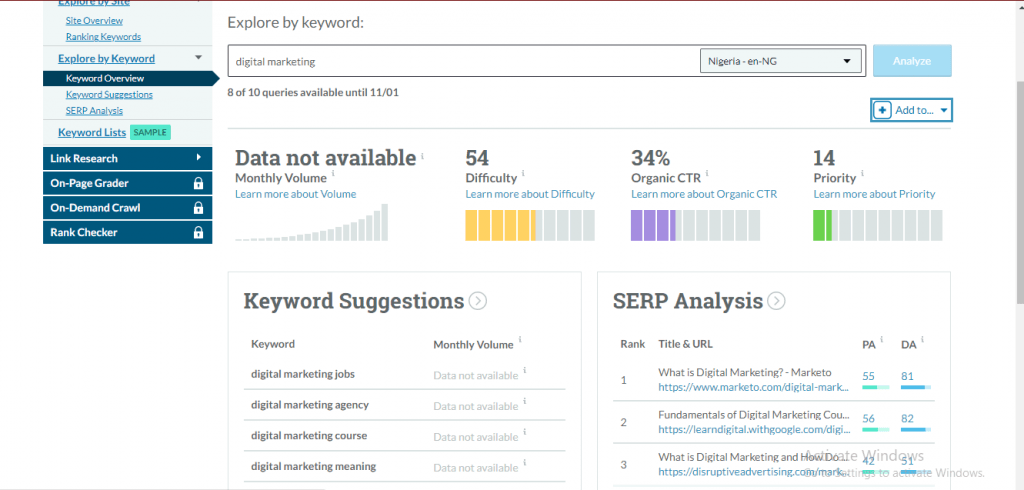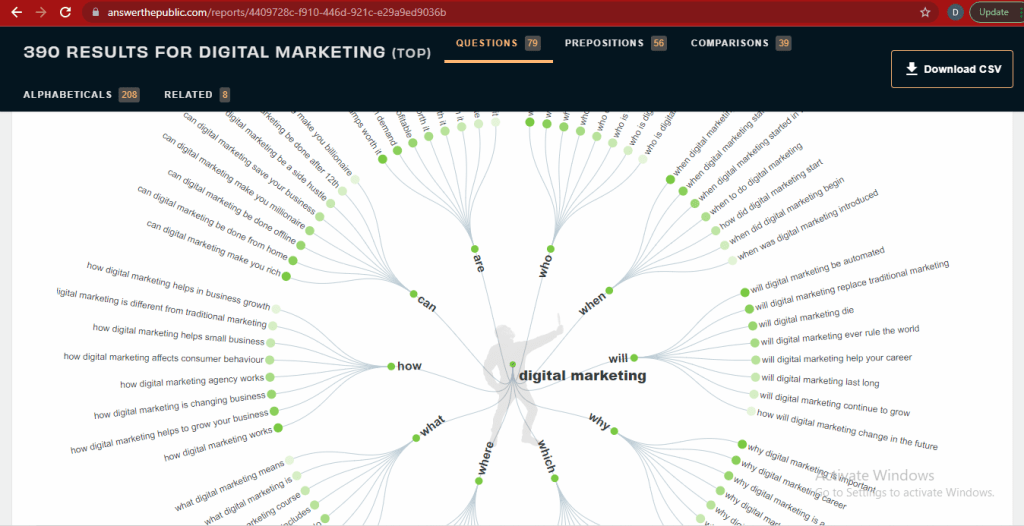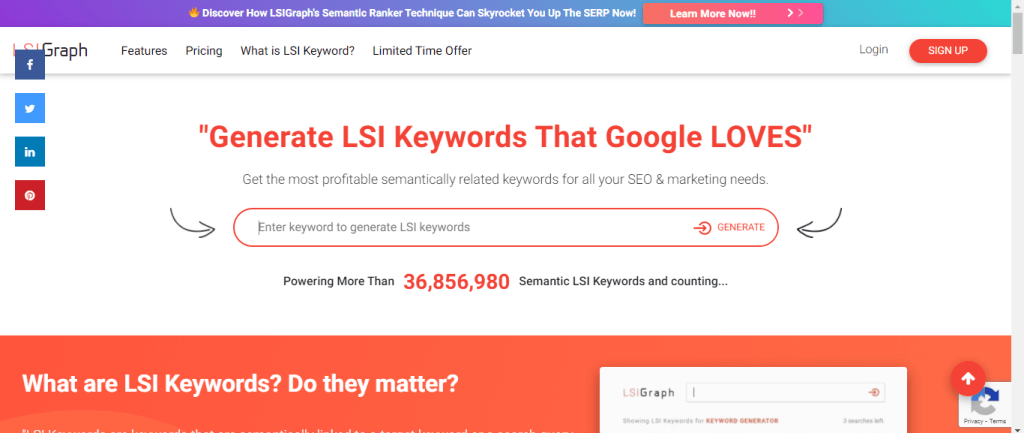SEO without keyword research is a dead-on-arrival mission. In fact, using a keyword research tool is a necessity for your search campaigns (PPC) and overall content strategy if you want to appear on GOOGLE SERP.
Launching a website, publishing a content, or selling something online often requires that you practice search engine optimization (SEO) and search campaign (PPC) strategies to get people to know about your product or service.
Keyword research is that forefront component of search engine optimization and search campaign.
This is because high-quality keywords are one of the most effective ways for your ad search campaign and website to appear on Google or other search engines. Especially when people are looking for products and services that are similar to yours.
To get quality keywords and drive quality traffic to your site, you need the right keywords, that’s where keyword research tools comes in.
Ready to learn them? Let’s dive in!
What is Keyword Research Tool?
Keyword research tool is designed for you to discover important keywords linked to the product or services you offer as well as locating data for those keywords such as search volumes, competitions and ad pricing.
Using keyword research tool is the basis of all online marketing.
The reason is if you don’t know how searchers are looking for the products you sell, the services you offer, or the information and expertise which you are sharing, then there is no way you can be found online.
Get 50% Discount to Master ALL Aspects of Digital Marketing That Can Earn You $2,500 - $5,000 a month (Even if you are a complete beginner!)
Our students that intentionally implement what they learn from our digital marketing course make back the entire course fee within a single month or more after completing our course because our course gives them many income generating options with unlimited earning potential with no age or location barrier. The best part is no technical skills are required.
An opportunity to change your lifestyle and make money working from anywhere in the world. The results our students get from our digital marketing course prove this could be applied to any market or country and that it is designed for any skill level and work background.
*By signing up, you agree to our privacy policy and terms of service.
The purpose of keyword research is to help you determine what your target audience is looking for and what it will take to rank for those terms or what will it take for your ads to show up for those terms.
If you want to drive traffic to your website or operate a high-converting Google Ads campaign, you need to know what your audiences are searching for and base your growth Strategy on that knowledge.
6 Best Free Keyword Research Tool You Need for SEO
The right keywords can help you get your ad or content in front of the right customers but you will need a keyword research tool that will help you sort out the perfect keyword.
There are different keyword research tools which can help you discover keywords that you can use to properly optimize your website, target terms for link building, know which content to generate for your audience or the keywords to target for search campaigns and they include:
1. Keyword Research Tool – Google Keyword Research Tool
The Google keyword research tool is a component of the Google ad system.
This tool is free, but you won’t be able to use it unless you have an active Google ad campaign.
Because the data comes directly from Google, it is widely used and is the most accurate source of keyword data for PPC. Its findings are compatible with AdSense monetization.
Google Pros
- It remains entirely free, regardless of your Google Ads usage.
- Valuable for budget forecasting when utilizing Google Ads.
- Serves as one of the best tools for PPC keyword research.
- Capable of generating keyword ideas exclusively from your website.
Google Cons
- Not much helpful for organics keyword research.
2. Keyword Research Tool – SEMrush Keyword Planner
SEMrush is one of the most effective keyword research tools available because it is well vast for every industry and website.
It provides you with access to the world’s largest database, which includes 20 billion keywords, 310 million advertising, and 17 billion URLs crawled each day.
When using this tool, you receive more than just numbers, it analyze your data and provides you with lots of information such as immediate SEO, content marketing, and advertising recommendation that can help you boost your online presence.
When you search for a particular keyword on SEMrush, it can provide you with hundreds of keyword idea.
It also provides you information about the domains that appear at the top of a search engines result page for a specific search query which is related to the keyword you search.
SEMrush Pros
- Abundant and detailed keyword data available.
- Offers a diverse selection of specialized keyword research tools.
- Offers a fairly generous free plan for users.
SEMrush Cons
- Might be daunting for individuals with limited experience in keyword research.
- Expensive for an upgrade.
3. Keyword Research Tool – Ahrefs Keyword Generator
The Ahrefs keyword generator is a free tool that can help you find long-tail keywords and target keyword terms that aren’t competitive. It is one of the best keyword research tools for content authors.
It uses a database of over ten billion keywords from 170+ countries to get the top 100 keywords for each keyword term or phrase you type in.
These keywords are generated using Google, Bing, YouTube, and Amazon.
The monthly search volume is provided by the Ahrefs keyword generator, as well as keyword difficulty scores for the first ten keyword ideas and how frequently a term has been changed.
You can conduct an unlimited number of searches without creating an account, but you can’t download your results. If you don’t have an account, you must also confirm that you are not a robot with each new search.
Ahrefs Pros
- Comprehensive free tools cater to various SEO needs.
- User-friendly interface for effortless navigation.
- Offers keyword research for non-traditional search engines like YouTube, Amazon, and Bing.
Ahrefs Cons
- Free version provides access to a limited amount of data.
4. Keyword Research Tool – Moz Keyword Planner
Moz keyword explorer is a fantatsic keyword tool that before you can access, you have to signup on the platform.
To sign up on the platform, go to the moz website and after you are done, type in a URL or the term you want to search for. You will then be redirected to create a moz account, which will provide you access to the keyword explorer and other free SEO tools.
This tool provides you with a monthly volume, organic difficulty, organic click through rate and a priority score.
It also gives a long list of keyword suggestions for the keyword term you searched for and the search engine result page analysis for pages ranking for that keyword terms.
You will see result for the top 10 sites for the keyword term you searched for, along with their domain authority and the number of root domains referring to them.
Moz is indeed a helpful keyword research tool.
Pros of Moz
- Offers a user-friendly data presentation compared to numerous other tools.
- The “Priority” score simplifies the identification of valuable keywords to target.
- Provides a wide array of tools accessible for free.
Cons of Moz
- Offers less data in comparison to more comprehensive tools.
- The free plan restricts users to only 10 queries per tool per month.
5. Keyword Research Tool – Wordtracker
The Wordtracker keyword planner tool can help you find high-performing keywords by providing data on search volumes, competition, and title of keywords you search for.
It also suggests terms that are similar to the keywords you’re looking for.
This tool will show you 38 search queries relating to the term you looked for, as well as questions that people are asking about the keyword you entered.
However, you have to upgrade or sign up for the 7-day free trial to get the full metrics or details for the keyword phrase you input.
Wordtracker Cons
- Offers valuable insights into keyword data.
- Provides a range of keyword research capabilities.
- User-friendly interface for easy navigation
Wordtracker Cons
- Limited features in the free version.
- Some users may find it less feature-rich compared to other tools on the market.
6. Keyword Research Tool – Answer the Public
Answer the public is a great tool that can help you come up with keywords idea and figure out what your potential buyers want to know.
It displays the question people are asking about that particular keyword when you enter the keyword in the search box. It gives you all of the who, what, where, when, why, and other inquiries that users have asked in a graphical design.
The only disadvantage of using this tool is that you only get three free searches per day.
Answer the Public Pros
- Generates a wide array of keyword ideas and questions.
- Offers insights into what users are searching for.
- Helps in understanding search intent.
- Provides a visually engaging presentation of data.
Answer the Public Cons
- Limited in-depth analysis compared to some other tools.
- Free usage is somewhat restricted.
7. Keyword Research Tool – LSIGraph
Latent semantic indexing (LSI) keywords are essentially keywords that are semantically related to your main keyword, used in search query.
This keyword research tool by far is the simplest tool anyone can use, all you need to do is to enter your target keyword and it will generate associated LSI keywords.
It helps because everyone searches differently or has a different goal in mind; it gives you an insight into what those searches are.
For example, when someone search for “digital marketing” it will generate a list of keywords.
These keywords reveals what other question people are thinking when they search “digital marketing”
LSI Graph Pros
- Focuses on LSI (Latent Semantic Indexing) keywords for improved content relevance.
- Simplified and user-friendly interface.
- Can be a valuable supplement to traditional keyword research tools.
LSI Graph Cons
- Limited in scope compared to comprehensive SEO platforms.
- May not cover all aspects of keyword research.
Some Terms Associated with Keyword Research Tool
When doing keyword research there are some terminologies you might not be familiar with and right now am going to list and explain some of these terminologies:
1. Search Volume
Search volume is the average number of times people search for a specific term per month, or the number of searches that keyword receives in a month. It helps you determine the popularity of a particular keyword you want to use.
2. Competition
Competition displays the level of competition for a keyword based on the geography and search Network targeting settings you’ve chosen. The level of competition is measured as low, medium or high on some keyword planner tools while other keyword planner tools use a number to measure the competition and the higher the number the more organic competition for that keyword.
3. CPC
Cost-per-click (CPC) is the estimated sum of money that advertisers are bidding for a particular keywords in order for their ads to be seen when someone search for a keyword related to the keyword term they bid on.
If a keyword has a higher cost-per-click (CPC), it means the keyword is valuable.
4. SEO or Keyword difficulty
This is the estimated competition in organic search; the higher the number the more competitive it will be to rank for that analyzed keyword.
It shows you how hard it would be for a website or a particular page on your website to rank organically in Google or other search engines for the analyzed keyword.
5. Paid difficulty
It shows the estimated competition in paid search for a particular keyword.
The higher the number, the more difficult it is to bid for that keyword term during paid search.
6. SERP Analysis
The SERP of a specific keyword you search for is provided by most keyword planner. SERP stands for search engine result page.
It displays a list of pages or URLs that are ranking for the keyword you searched for, and you can use this information to outrank your competitors.
7. Trends
This shows how the monthly search volume for a term has changed over the last 12 months, and most keyword planner include trends for the phrases you looked for.
8. In Anchor and Title (IAAT)
When using various keyword planner tools for keyword research, The metrics IAAT might come up, this metrics gives a count of webpages where the keyword term you’re looking for appears in both the title page and the content of the backlink.
Conclusion
Keywords remain a fundamental element in both SEO and paid search strategies.
Even as search engine algorithms evolve and incorporate more signals, keywords retain their pivotal role in matching search queries with relevant websites. Consequently, keyword research tools hold significant importance in your quest for the right keywords. They form the bedrock upon which your website’s success is built.
Either you’re creating a blog or an e-commerce website, you will need to do keyword research to look for what your target audience are searching for.
For more practical approach on how to use keywords and get your website to rank on Google and other search engines, register for our 90% practical digital marketing course. Check here for yourself the wonders of our course in people’s career.
Keyword Research Tool FAQ
What are the three steps to keyword searching?
The process of conducting keyword research typically involves these three key steps:
1. Generate Keyword Ideas
Start by brainstorming and gathering a list of potential keywords relevant to your content or topic. Think about words and phrases that your target audience might use to search for information related to your subject. Utilize keyword research tools, competitor analysis, and industry knowledge to expand your list.
2. Keyword Analysis
Once you have a list of potential keywords, assess their relevance, search volume, and competition. Keyword research tools like Google Keyword Planner, SEMrush, or Ahrefs can provide valuable data on these factors. In addition, aim for a balance between keywords with sufficient search volume and manageable competition.
3. Keyword Selection
After analyzing the data, choose the most strategic keywords for your content. Also, focus on keywords that align closely with your content’s purpose and the intent of your target audience. Ensure those selected keywords are incorporated naturally into your content. They should be included in your headings, body text, and metadata, to optimize your content for search engines.
More Resources:
What Are Keywords & How Do You Use Them For SEO?
What Is Keyword Research? |Tools, Tips And Examples
5 Reasons Why Keyword Research for Nigerian Businesses Is Important
Effective SEO Keywords | 7 Tips To Choosing The Right SEO Keywords
How To Use Google Keyword Planner | The Definitive Guide For SEO Keyword Research
Google Adwords: What is Google Adwords and How does it work?



